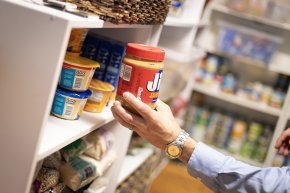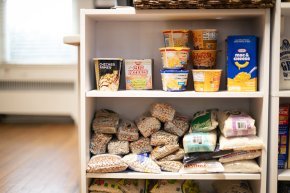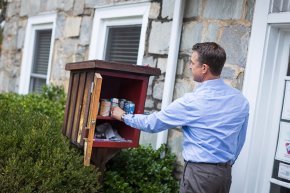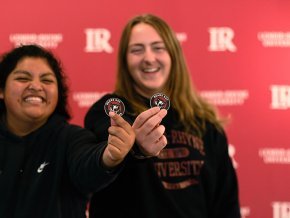
Feed the Bears
In recent years, food insecurity has become an all-too-common part of the university experience for students nationwide. In late 2024, the Lenoir-Rhyne University counseling and wellness center and the office of student support and outreach formed a partnership to maintain and grow food pantry resources on campus to ensure no Bear ever goes hungry.

“We know that people can’t succeed in school or work if their basic needs aren’t met,” said the Rev. Todd Cutter ’96, M.A. ’00, M.Div. ’04, university pastor, director of spiritual life, director of counseling services and co-director of the food pantry. “We have food pantries located in the counseling and wellness center and on the second floor of Cromer Center near the office of Student Affairs. We also have a small outpost in Grace Chapel. It’s entirely self-service, anonymous and available to anyone who needs it – no questions asked.”
Food insecurity is the lack of consistent access to nutritious, safe and culturally appropriate food options. It affects all populations, but studies from the United States Government Accountability Office indicate around 30 percent of college students nationwide were coping with food insecurity in 2024. On some campuses that number reached as high as 40 percent.
“Hunger alone is distracting for students, but food insecurity can also result from underlying distractions. Some students are working multiple jobs that keep them from focusing on their studies,” shared Carla Fowler ’97, M.A. ’16, director of student support and outreach and co-director of the food pantry. “Other students might be balancing obligations that keep them from accessing food services on campus during their opening hours. We’ve even seen students experience food insecurity because severe social anxiety keeps them out of the dining hall. The food pantry is a step toward addressing hunger as well as those underlying causes.”
Local support
While students benefit from anonymous and open access to food pantry resources, that anonymity has presented a challenge in data necessary for grant applications that would ensure the food pantry’s continued growth.

“Ideally we would use a card-swipe system that would keep student identities secure while tallying the numbers of students using the pantry, how frequently and even the kinds of items that are most popular – but that kind of system is very expensive,” Fowler explained.
In the coming year, Fowler hopes to conduct an initial campus-wide survey, which would allow the food pantry to apply for grant funds that could expand both accessibility and inventory to include more varied food items as well as hygiene products, and products to assist student-parents, such as diapers and formula.
In the meantime, the initiative is fueled by generous donations from the campus community as well as local residents, businesses and congregations who donate food and financial support to supply students with nutritious meals.

“We have a running list of faculty, staff and local congregations who have asked for updates on what we need and when we need it,” said Cutter. “I'm always humbled by how supportive people are of students that they may never interact with and that care shown by the community. It means more than I can really put into words.”
Fowler also praised the support of the university and community to help meet students’ basic needs. “LR has been very intentional about crafting a community of care where all students are seen and valued. The food pantry is a part of that, allowing students to be successful by removing the burden of worrying where your next meal is coming from,” she said.
How to help
The items listed below are in consistent demand at the food pantry – shelf-stable, portable, self-contained items are especially popular because students may not have access to a full kitchen. Pull-tabs on cans are desirable, but the pantry also accepts can openers.
Anyone who wants to join the mailing list or arrange a drop-off for a donation can do so my contacting Cutter at todd.cutter@lr.edu or Fowler at carla.fowler@lr.edu.
-
Shelf-stable microwaveable meals (e.g. macaroni and cheese, rice and/or pasta meals)
-
Canned or microwaveable soups
-
Canned meats (chicken, tuna, corned beef, etc.)
-
Pop Tarts
-
Granola bars
-
Snack crackers
-
Cereal
-
Peanut butter
-
Jelly
-
Fruit snacks
-
Canned beans, vegetables, fruit
-
Dry rice and pasta
-
Bottled drinks (water, Gatorade, juice, etc.)
-
Spices and seasonings

Lenoir-Rhyne celebrates the success of Giving Tuesday, an annual global giving movement for the causes and organizations we care most about.
View More
Public health major Jocelyn Florez '25 shares her passion for evaluation, prevention and protection as she does her part to build healthier communities.
View More